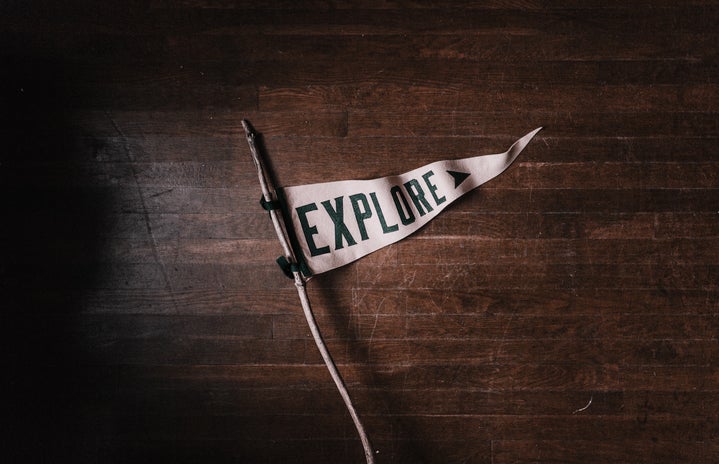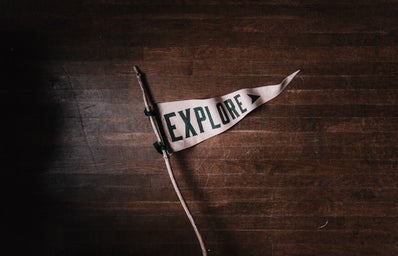When you first meet Wykia Macon, the bright-eyed, charismatic graduate student, you’ll wonder how she already has so much under her belt. She’s working on her doctoral degree in International and Comparative Education, but she also happens to be a returned Peace Corps volunteer and an FSU campus recruiter. Wykia served in the Peace Corps in a rural school in Esageri, Kenya from 2011 to 2013 as a Deaf Educator. She met with me to talk about her experience and how you can become a Peace Corps volunteer as well!
Courtesy: Wykia Macon
Wykia, pictured in the black shirt in the back, with her students.
Her Campus (HC): So let’s start off with why you joined Peace Corps.
Wykia Macon (WM): I joined the Peace Corps because it combined two of the things I am really interested in—service work and international experience. Halfway through my undergrad, I realized that I wanted to work in education. I also really wanted to see the world. I couldn’t afford to study abroad so I was exploring other options. I discovered Peace Corps and realized that I could teach in many awesome countries for free. That’s all I needed; I was in!
HC: What was the hardest thing about being in Peace Corps?
WM: In my opinion, the hardest thing about serving in the Peace Corps is probably the isolation. While you go in as a group, after the first three months of training most volunteers are sent to their “site” to live and work on their own. In my new home, I was directly immersed in a culture that was far different from my own. When you’re deep in another culture, you truly start to realize the values, beliefs and actions that are encompassed in your own culture. I had a lot of time to think about the things I did and the way I viewed the world. Self-reflection can be scary, but it is also very enlightening. I think we often feel that America doesn’t have a distinct culture because we are such a melting pot, but I beg to differ. Also, in the Peace Corps there may or may not be another volunteer in your area. My closest volunteer was 4-5 hours away. However, many volunteers would meet in a bigger city (which was 1.5 hours away) to get ice cream, chat about life, or just “feel American” for a bit. All of this to say, isolation is tough but there is always a positive way to view it. It taught me a lot about myself, the Kenyan culture and most importantly, it made me appreciate and value relationships much more than I ever had before.
HC: What is the most important thing you learned overall?
WM: My community was my school. I lived on the compound and so did the kids for 9 months out of the year. That was my first time being exposed to the Deaf population and the barriers that they faced. Many people with disabilities in developing countries face social stigmas throughout their life. They are often seen as “cursed” or inferior. This often upset me because I knew my students were capable of much more than anyone cared to know. My kids never let this bother them. They were some of the happiest people I ever met. They laughed, they sang (with signs), they told stories, they loved and appreciated me and I loved them back. They taught me how to enjoy a simple life and that a million things could be against you but you can still be happy. When life throws me curveballs, I keep this in mind.
HC: What do you think that the community you were part of wants us to know about them?
WM: My students would want you to know that people who are deaf (and all those with disabilities for that matter) should be seen just like non-disabled people. They are strong and capable. The locals in my area would probably want you to know that not everyone in Kenya (or Africa) is poor, naked, or living in a hut. The teachers or other adults would often ask me if Americans associated certain stereotypes with them. Usually they would say absolutely absurd statements that I would immediately refute because in my mind Americans weren’t that closed-minded. However, when I sat back and thought about it, we do have many stereotypes about people living in developing countries. Am I saying that they are all “making it rain” shillings (Kenyan currency)? No, that’s not what I’m saying. I am saying that many of them work hard, earn their keep, and live much better lives than we see in National Geographic or those sad infomercials.
HC: What were some similarities you noticed between the people there and here?
WM: This is a question I think about more and more as I travel to different countries and meet a variety of people. What do all people value no matter their background or culture? One thing I would have to say is family. No matter where you go, people love, care and support their families. I think this is seen even more in Kenya, where many extended families live fairly close in proximity. I loved the dedication and commitment many parents exhibited to make sure their children had better lives than their own. And while it is definitely also the case in America, in many developing countries, education is heavily valued because it is seen as one of the main factors of upward mobility. Parents would spend their last to pay their children’s school fees. With education coming at such an expensive cost, it was valued much more by students. You would see children studying from 6am-8pm, breaking only for meals and bathroom breaks. I think I went a bit off topic, so to sum it up, the love and support of family can be seen all over the world.
HC: What was the best thing about being in the Peace Corps?
WM: Oh boy, I’m not sure I can pick just one thing. If I absolutely had to then it would have to be my students once again. These kids welcomed me with open arms even when my signing was awful and I could barely communicate with them. They offered to help me wash my clothes—after they laughed at me a bit—because they noticed that I was awful at washing by hand. They knocked at my door day and night to talk, play or ask me for help on a math problem. They were super eager to learn, which made it that much more rewarding to teach. I won’t lie and say they never drove me up the wall because we were together all day, every day and that’s just what happens when you’re around anyone 24/7. However, I will say that as quickly as they drove me up that wall, they would make me laugh and forget why I was even annoyed. They gave me reasons to stay on my hardest days and they are the reason that I decided to pursue my PhD and study in my current field. My kids are awesome and I can only hope that I meant half as much to them as they do me.
HC: What advice would you give someone that is interested in the Peace Corps?
WM: Come talk to me! I work as the local Peace Corps recruiter and would love to answer any questions or discuss any concerns that you may have about the Peace Corps. I will be very honest with you and I can tell you more about my personal experiences, if you want more stories. The Peace Corps is tough, and may not be for everyone. However, if you think it is the right move for you then it’s a rewarding experience like no other.
Peace Corps is a volunteer program funded by the United States. Volunteers usually serve 27 months in a specific country. For more information on the Peace Corps and the benefits, please visit peacecorps.gov or contact Wykia at fsupeacecorps@gmail.com.


